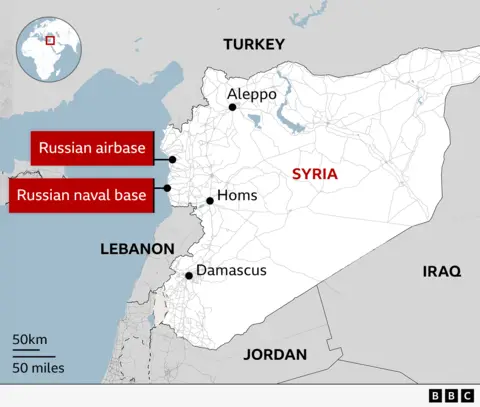For nearly a decade it was Russian firepower that had kept Bashar al-Assad in power.
Until the extraordinary events of the last 24 hours.
Damascus has fallen, Syria’s president has been toppled and has, reportedly, flown to Moscow.
Quoting a source in the Kremlin, Russian news agencies and state TV reported that Russia has granted Assad and his family asylum “on humanitarian grounds”.
In a matter of days, the Kremlin’s Syria project has unravelled in the most dramatic circumstances, with Moscow powerless to prevent it.
In a statement the Russian foreign ministry announced that Moscow was “following the dramatic events in Syria with extreme concern.”
The fall of the Assad regime is a blow to Russia’s prestige.
By sending thousands of troops in 2015 to shore up President Assad, one of Russia’s key objectives had been to assert itself as a global power.
It was Vladimir Putin’s first major challenge to the power and dominance of the West, away from the former Soviet space.
And a successful one, it had seemed. In 2017 President Putin visited Russia’s Hmeimim air base in Syria and declared that it was mission accomplished.
Despite regular reports that Russian airstrikes were causing civilian casualties, the Russian defence ministry felt confident enough to fly international media out to Syria to witness the Russian military operation.
On one such trip I remember an officer telling me that Russia was in Syria “for the long haul”.
But this was about more than just prestige.
In return for military assistance, the Syrian authorities awarded Russia 49-year leases on the air base in Hmeimim and naval base in Tartous.
Russia had secured an important foothold in the eastern Mediterranean. The bases became important hubs for transferring military contractors in and out of Africa.
A key question for Moscow: what will happen to those Russian bases now?

The statement announcing Assad’s arrival in Moscow also mentioned that Russian officials were in contact with representatives of “the Syrian armed opposition”.
The state TV anchor said opposition leaders had guaranteed the security of Russian military bases and diplomatic missions on the territory of Syria.
Russia’s foreign ministry says the bases in Syria have been put “on a state of high alert”, but claims there is “no serious threat to them at the current time.”
Bashar al-Assad was Russia’s staunchest ally in the Middle East. The Kremlin had invested heavily in him. The Russian authorities will struggle to present his toppling as anything but a setback for Moscow.
Still, they’re trying… and looking for scapegoats.
On Sunday night Russian state TV’s flagship weekly news show took aim at the Syrian army, apparently blaming it for not fighting back against the rebels.
“Everyone could see that the situation was becoming more and more dramatic for the Syrian authorities,” anchor Yevgeny Kiselev said.
“But in Aleppo, for example, positions were given up virtually without a fight. Fortified areas were surrendered one after another and then blown up, despite [government troops] being better equipped and outnumbering the attacking side many times over. It’s a mystery!”
The anchor claimed that Russia “had always hoped for reconciliation [between different sides] in Syria.”
Then his final point:
“Of course we are not indifferent to what is happening in Syria. But our priority is Russia’s own security – what is happening in the zone of the Special Military Operation [Russia’s war in Ukraine].”
There’s a clear message here for the Russian public.
Despite nine years of Russia pouring resources into keeping Bashar al-Assad in power, Russians are being told they have more important things to worry about.













